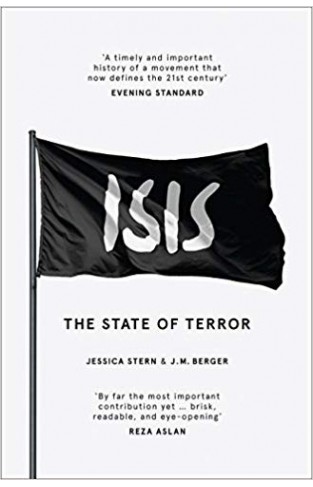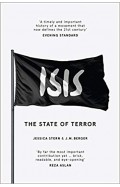ISIS: The State of Terror
By: Jessica Stern , J. M. Berger
-
Rs 897.75
- Rs 1,995.00
- 55%
You save Rs 1,097.25.
Due to constant currency fluctuation, prices are subject to change with or without notice.
The first major book on ISIS to be published since the group exploded on the international stage in summer 2014.
Drawing on their unusual access to intelligence sources and material, law enforcement, and groundbreaking research into open source intelligence, Stern and Berger outline the origins of ISIS as the formidable terrorist group it has quickly become.
‘State of Terror’ delves into the ‘ghoulish pornography’ of pro-jihadi videos, the seductive appeal of ‘jihadi chic’ and the startling effectiveness of the Islamic State’s use of social media as a means of luring and recruiting citizens from countries such as the United States, Great Britain, and France―using recent examples such as Douglas McCain, the American citizen from Minnesota who joined ISIS and died in combat fighting on the side of the Islamic State.
Although the picture Stern and Berger paint is bleak, ‘State of Terror’ also offers well-informed thoughts on potential government responses to ISIS – most importantly, emphasizing that we must alter our present conceptions of terrorism and react to the rapidly changing jihadi landscape, both online and off, as quickly as the terrorists do. ‘State of Terror: Jihad in the 21st Century’ is not only a compelling account of the evolution of a terrorist organization, but also a necessary book that attempts to answer the question of what our next move – as a country, as a government, as the world – should be.
The first major book on ISIS to be published since the group exploded on the international stage in summer 2014.
Drawing on their unusual access to intelligence sources and material, law enforcement, and groundbreaking research into open source intelligence, Stern and Berger outline the origins of ISIS as the formidable terrorist group it has quickly become.
‘State of Terror’ delves into the ‘ghoulish pornography’ of pro-jihadi videos, the seductive appeal of ‘jihadi chic’ and the startling effectiveness of the Islamic State’s use of social media as a means of luring and recruiting citizens from countries such as the United States, Great Britain, and France―using recent examples such as Douglas McCain, the American citizen from Minnesota who joined ISIS and died in combat fighting on the side of the Islamic State.
Although the picture Stern and Berger paint is bleak, ‘State of Terror’ also offers well-informed thoughts on potential government responses to ISIS – most importantly, emphasizing that we must alter our present conceptions of terrorism and react to the rapidly changing jihadi landscape, both online and off, as quickly as the terrorists do. ‘State of Terror: Jihad in the 21st Century’ is not only a compelling account of the evolution of a terrorist organization, but also a necessary book that attempts to answer the question of what our next move – as a country, as a government, as the world – should be.
Zubin Mehta: A Musical Journey (An Authorized Biography)
By: VOID - Bakhtiar K. Dadabhoy
Rs 472.50 Rs 1,050.00 Ex Tax :Rs 472.50
Myths Illusions and Peace: Finding a New Direction for America in the Middle East
By: Dennis Ross
Rs 876.00 Rs 1,095.00 Ex Tax :Rs 876.00
The Origins of Political Order From Prehuman Times to the French RevolutioN
By: Francis Fukuyama
Rs 3,116.00 Rs 3,895.00 Ex Tax :Rs 3,116.00
Reset: How This Crisis Can Restore Our Values and Renew America
By: Kurt Andersen
Rs 400.00 Rs 500.00 Ex Tax :Rs 400.00
How To Win A Cosmic War God Globalization And The End Of War
By: Reza Aslan
Rs 556.00 Rs 695.00 Ex Tax :Rs 556.00
Game Change Obama And The Clintons McCain And Palin And The Race Of A Lifetime
By: John Heilemann
Rs 636.00 Rs 795.00 Ex Tax :Rs 636.00
Made to Stick: Why Some Ideas Take Hold and Others Come Unstuck
By: Chip Heath & Dan Heath
Rs 2,396.00 Rs 2,995.00 Ex Tax :Rs 2,396.00
No similar books from this author available at the moment.
No recently viewed books available at the moment.
Zubin Mehta: A Musical Journey (An Authorized Biography)
By: VOID - Bakhtiar K. Dadabhoy
Rs 472.50 Rs 1,050.00 Ex Tax :Rs 472.50













-120x187.jpg?q6)






-120x187.jpg?q6)






